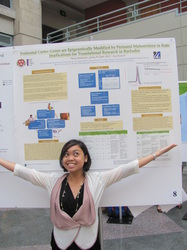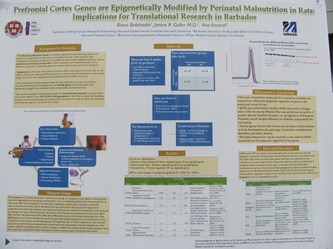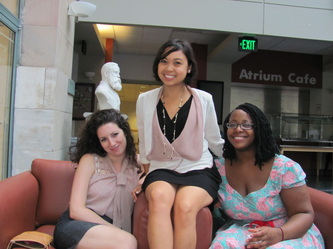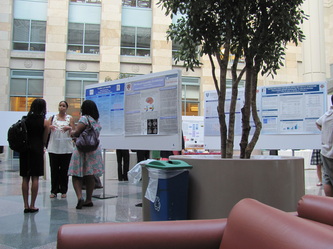|
8/19/2012 0 Comments You think what you eat: Link between manutrition, DNA and mental health - Week 5Week 5: Lessons learnedby Riana Balahadia Hey Scientistas! So the summer’s winding down now, and my internship actually ended on Thursday, August 9th. There will be a nice dinner reception for all the SURF (Summer Undergraduate Research Fellowship) students at Harvard Medical School, which will then be followed by everyone’s poster presentations. This past week my co-workers, Sarah and John, and I have been working hard to consolidate all our work into a concise, 3ft x 4ft poster. I’m really excited to present what I’ve been working on! Overall, this summer has been a great learning experience. I didn’t just learn about the Barbados Nutrition Study (BNS). I learned how to think critically like a scientist and how to conduct good research. Working at my job taught me how to look at a piece of data and see the important connections about the lives it represents. Dr. Galler has been a wonderful mentor. I think watching her work really gave me insight into how a successful, longitudinal study works—especially one that’s lasted for so long! By having repeated observations of the same variables over a long period of time, you can make valuable conclusions about the adult effects of an early stressor. My project with the prenatally malnourished rats somewhat models the participants of the BNS. One important aspect of good research is that it requires multi-disciplinary approaches and teamwork. Dr. Galler has been trained as a psychiatrist, yet her closest partner in the study was a pediatrician. She has also enlisted the help of nutritionists, clinical psychologists, and scientists working in genetics and rat behavior. Her work isn’t necessarily focused on one aspect of post-natal malnutrition. As I’ve mentioned, the Barbados Nutrition Study has studied multiple adverse outcomes and variables such as: child abuse, attention deficits, maternal depression, socioeconomic status, obesity, and metabolic syndrome. Dr. Galler once told me that she didn’t really believe in hypothesis-based research, because “you might miss something you didn’t even think of before!” Indeed, having an open mind can mean the difference between missing and discovering an important finding. Given the many players in the study, communication is absolutely essential. E-mails should be answered almost immediately, and no phone calls should be left without a follow-up. Meetings are also necessary for regular updates. My co-workers and I would sit in on the weekly meetings at Judge Baker’s Children Center. We gave mini-presentations on our work to the other doctors. They seemed really enlightened when we presented our point of view. For example, my presentation on epigenetics and mental health piqued the interest of one psychiatrist interested in maternal depression. I also attended a separate meeting for the rat studies, from which I finally understood my position in the study as a whole. The epigenetic works on the rats are the preclinical, or “pre-human,” studies. The idea is to use the results as a sort of guide for when we do epigenetic work on blood samples from the Barbadian cohort. Essentially, we want to see if the same genes in rats will be expressed similarly in a human population. When you hear the work of others, you see how your own work fits in with the greater purpose of the research. The meetings are not only informative, but also motivating. Finally, a vital factor in research is the curiosity and passion that fuels it. Dr. Galler has been able to continue the BNS for 42 years simply because her findings led to more unanswered questions that she wanted to answer. She is very, verydriven and even stubborn at times (“Ask nicely three times. If there’s still no response, then get down to business,” says Dr. Galler). I hope after this summer I will successfully follow her main advice: to go where your passion leads you and not plan the future too far ahead because you never know where the chances of life will take you. Hope you’ve all enjoyed your summers so far, Scientistas! Riana, over and out. About the Blogger
0 Comments
Your comment will be posted after it is approved.
Leave a Reply. |
The Lab JournalWelcome to the summer internship series of 2012! Follow 9 Scientista bloggers through their summer internships to catch a glimpse of what it is like to be a scientista^TM. By Title- India Presents: A "New World Symphony"
- Through The Lens: The Intricacies Of Diabetes - Do Nanoparticles Glow? - Using Unusual Animals to Study Human Disease - Using the Hubble Telescope - You Think What You Eat - Experimenting With the Life of a Scientist(a) - 18.085: My Summer at MIT - Science Heals: A Summer of Global Health Research By BloggerRabeea Ahmed
Riana Balahadia Shaira Bhanji Nzuekoh Nchinda Amy Beth Prager Natalie Punt Juliet Snyder Pin-Wen Wang Stephanie Wang Archives |
The Scientista Foundation, Inc. All Rights Reserved © 2011-2021 | Based in NY | [email protected]
The Network for Pre-Professional Women in Science and Engineering
The Scientista Foundation is a registered 501(c)(3) -- Donate!
The Network for Pre-Professional Women in Science and Engineering
The Scientista Foundation is a registered 501(c)(3) -- Donate!






 RSS Feed
RSS Feed